|
|
|
Sort Order |
|
|
|
Items / Page
|
|
|
|
|
|
|
| Srl | Item |
| 1 |
ID:
114169
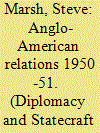

|
|
|
|
|
| Publication |
2012.
|
| Summary/Abstract |
In 1949-1950, Britain rejected ideas of being a third force between the post-war Superpowers and adopted instead an approach that has been the keystone of British foreign policy from that point onwards: "hugging America close." The aspiration was to establish a position closely related to the United States yet sufficiently independent, effectively to harness American power to British ends. This now familiar position has been much-debated recently in the context of post-9/11 military interventions in Iraq and Afghanistan especially. However, this analysis examines three crises immediately following the British decision in 1949-1950 to give priority to the Anglo-American "special relationship" to demonstrate that, for Britain, this policy from the onset was both advantageous and potentially difficult. The outcomes of crises over NATO's Atlantic Command, Iranian oil, and ANZUS demonstrate how expansion of United States influence benefitted Britain but sometimes also required painful British adjustment and loss of prestige.
|
|
|
|
|
|
|
|
|
|
|
|
|
|
|
|
| 2 |
ID:
114165
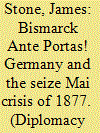

|
|
|
|
|
| Publication |
2012.
|
| Summary/Abstract |
The seize mai crisis of 1877 was the occasion for last of the three war scares that punctuated Franco-German relations in the 1870s. However, it has not been given the detailed scrutiny it deserves. It was not only important for the amount of influence that Bismarck exerted during a six month period to influence the course of French domestic politics at a critical juncture. This crisis also provides a cipher for understanding the earlier crises of 1873-1874 and 1875 since the German Chancellor pursued his key objective of supporting the establishment of a republic much more openly in 1877 and his tactics are much better documented than in the earlier scares. A closer look at the events of 1877 reveals more continuity in both the means and ends used by Bismarck in his dealings with France during the mid-1870s than was previously thought.
|
|
|
|
|
|
|
|
|
|
|
|
|
|
|
|
| 3 |
ID:
114170
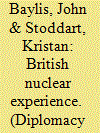

|
|
|
|
|
| Publication |
2012.
|
| Summary/Abstract |
Strategic culture, beliefs, and perceived status in an anarchic international system played a crucial role in the development of British nuclear weapons policy from its inception in the Second World War through to the Nassau Agreement in 1962 that provided Britain with a sophisticated submarine nuclear deterrent-Part Two, in the next issue of Diplomacy and Statecraft, will look at the period from 1962 to the present day. Adopting what has been described as a "Conventional Constructivist" approach, the argument is that these ideational factors have helped to shape the character of Britain's nuclear capability and the operational plans for the potential employment of those capabilities. It also provides an insight into how these factors have shaped elite views of the UK nuclear deterrent in the crucial early years of its development.
|
|
|
|
|
|
|
|
|
|
|
|
|
|
|
|
| 4 |
ID:
114171
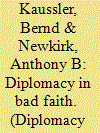

|
|
|
|
|
| Publication |
2012.
|
| Summary/Abstract |
American-Iranian relations have always been the most significant variable in Iran's nuclear programme, yet, in the absence of direct diplomatic communication, have never been addressed during multilateral negotiations. Since 1979, misperceptions of each other's intentions and capabilities have prevented Iran and the United States from escaping an ambiguous "cold war" relationship. The decision of the Obama and Ahmadinejad governments to open negotiations in Switzerland in Autumn 2009 marked the first bilateral high-profile meeting between both countries in over thirty years. At this time Iran was dealing with the effects of its June presidential elections, which was Teheran's greatest crisis of legitimacy since the Islamic Revolution. In addition, Iran's power elite was informed by a siege mentality vis-à-vis its own people and the international community. Also at this time, the Barack Obama Administration decided to engage Teheran directly. The Iranian government failed to reciprocate American initiatives. The breakdown of talks has, in turn, produced a new United States-sponsored containment doctrine against Iran. Whilst Washington may have shed an exclusive reliance on belligerency, as was the case under President George W. Bush, coercion remains the basis of Iran policy. Within two years after the Obama Administration began experimenting with "two-track" diplomacy, the situation has returned to mutual hostility. The United States and Iran are conducting diplomacy with each other in bad faith.
|
|
|
|
|
|
|
|
|
|
|
|
|
|
|
|
| 5 |
ID:
114167


|
|
|
|
|
| Publication |
2012.
|
| Summary/Abstract |
The Advisory Committee on Problems of Foreign Relations (ACPFR) of Franklin D. Roosevelt's State Department first met in late December 1939 and operated until early Summer 1940. Its previously overlooked deliberations, chaired by the dynamic Under-Secretary of State Sumner Welles, are important in three related areas. First, the ACPFR was an early marker of the Administration's later post-war planning, notably the Advisory Committee on Postwar Foreign Policy. Second, a remarkable swath of issues were discussed surrounding the ongoing conflict, prospects for its end, and the shape of the post-war world, particularly regarding Europe and the consequences of a German victory. The third area of ACPFR importance is in illuminating our understanding of the Roosevelt Administration's thinking on the conflict during the complex atmosphere of the Phoney War. The analysis concludes that although the fruits of Committee's effort would be indirect, they were nonetheless important in later post-war planning efforts that contemplated a breadth of options for the post-war world before American lives were put in harm's way.
|
|
|
|
|
|
|
|
|
|
|
|
|
|
|
|
| 6 |
ID:
114168
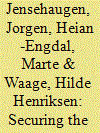

|
|
|
|
|
| Publication |
2012.
|
| Summary/Abstract |
Between early 1947 and May 1948, the Zionist movement went from being a non-state actor representing the minority population within the territory of the British Mandate of Palestine to establishing the State of Israel, which would be recognised almost instantaneously by the world's two Superpowers, the United States and the Soviet Union. Such a result, however, was never a given. What processes allowed a non-state actor, the Zionist movement, to secure international acceptance for the creation of a Jewish state in highly ambiguous circumstances? This analysis explores the dual-track adopted by the Zionist movement, whereby it worked to create facts on the ground within Palestine whilst securing support for its state-building project at the international level. By establishing state-like institutions in Palestine whilst building international support, the Jewish Agency was able to secure for itself a unique place from which to declare statehood.
|
|
|
|
|
|
|
|
|
|
|
|
|
|
|
|
| 7 |
ID:
114166
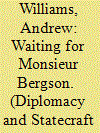

|
|
|
|
|
| Publication |
2012.
|
| Summary/Abstract |
This analysis follows upon an article that previously was published in Diplomacy and Statecraft (2010) on Norman Angell's relationship with French thinking and political life. These two papers suggest international historians should look much more widely for our sources of understanding the policy options of the Powers in the early twentieth century than the habitual diplomatic documents and the like. They also aim to explore how ideas become policies, seen through the eyes of particular key actors. This analysis looks at the relations between the French philosopher, Henri Bergson, and a contemporary major American intellectual, Nicholas Murray Butler, between 1913 and 1932 using their letters as a basis. Bergson's fraught relationship with Butler sheds some light on Franco-American relations during the turbulent decades they knew each other. The article also looks at the thinking of James T. Shotwell, a long-time collaborator with Butler and, more generally, at the approaches to the contemporary international relations of their day that underpin and mark out American and French differences about how to construct a global order after the First World War.
|
|
|
|
|
|
|
|
|
|
|
|
|
|
|
|
|
|
|
|
|